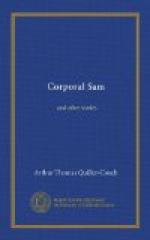It was hard on Dapple, but the doctor urged him for a mile before his natural kind-heartedness reasserted itself and he reined up the good old horse, to breathe him.
Now was his time to have a look at the bag. He reached down and lifted it to his knees, and again its weight surprised him. ’It will be locked, no doubt,’ said the doctor to himself, as he drew the off gig-lamp from its socket to light his inspection.
But no: the bag was fastened by an ordinary spring-catch, and, when he pressed this, fell open easily. He listened for a second or two, with a glance over his shoulder into the darkness behind. But nothing could be heard—nothing but the night-call of a curlew somewhere on the moor, far to his right. Holding the lamp a little higher in his left, he thrust his right hand into the bag, groped, and drew out—
First of all, a pistol,
and whether loaded or not he deferred
for the moment to examine.
Next, four small but
heavy canvas bags, each tied about the neck
with a leathern thong.
By the weight and the look, and also by
the sound of them when
shaken, they contained money.
Next, a pair of rubber-soled Blucher boots.
Next, a small square
case, which he opened and found to contain
a pocket-compass.
Next, a pair of night-glasses.
Next, a neck-comforter of knitted gray worsted
And, lastly, a folded map.
While he made this inventory, Doctor Unonius kept Dapple at a standstill; for thus only was he secure of hearing the smallest sound on the road behind. But now he judged it prudent to put another half a mile at least between him and pursuit, and so, replacing the lamp and hastily repacking the bag—with all but the pistol, which he kept handy on the seat beside him, and the map, which he thrust into the breast of his greatcoat—he urged the old horse into a fresh trot, nor pulled up again until he came to the glimmering white gate of Landeweddy Farm.
The courtlege of Landeweddy was hedged with tamarisks, now leafless, and through these, above the wall’s coping, the upper part of the house loomed an indistinct mass against the indigo-gray night. No light showed anywhere—as why should the widow Tresize or her maid Tryphena be awake at such an hour? The doctor would have required sharp eyes indeed to note, as he drew rein, that the blind of an upper window at the south-east corner had been drawn aside an inch or so out of the perpendicular. Had he detected this, indeed, it would have meant no more than that the widow, awakened from her slumbers by the sound of wheels, had arisen to satisfy the curiosity natural to women.
But Doctor Unonius, noting it not, drew forth the map from the breast of his greatcoat, unfolded it, and was proceeding to study it, again by help of the lamp. He recognised it at first glance for a map of the coast and country about Polpeor, and for this he was prepared; but the same glance showed him a slip of paper pinned to the map’s left upper corner. The paper bore a scrawl in pencil, ill-written, but decipherable—




